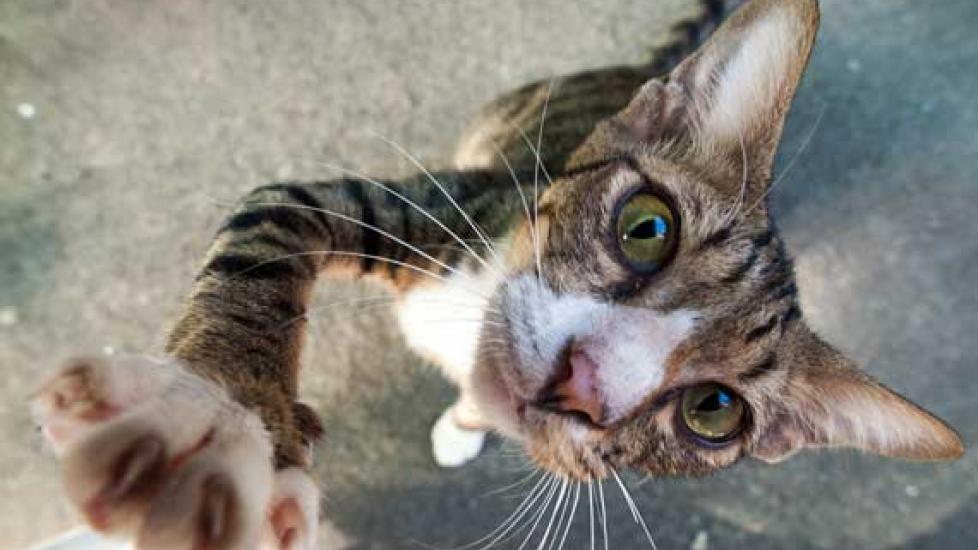Is Your Cat Suffering from Cognitive Dysfunction Syndrome?
Cognitive Dysfunction Syndrome (CDS) is most often identified with older dogs. However, cats also can suffer from this condition. In fact, one study indicated that 28 percent of all cats between 11 to 14 years of age exhibited at least one sign of cognitive dysfunction. For cats over 15 years, the incidence increased to 50 percent of all cats.
What Are the Signs of Cognitive Dysfunction in Cats?
Cats suffering from cognitive dysfunction may suffer from one or more of the following:
- Disorientation. Affected cats may get lost, even in their own home. They may stare fixedly at one spot. They may wander aimlessly or get “stuck” because of an inability to navigate around objects in their path.
- Memory Changes. Cats with cognitive dysfunction may stop using the litter box. They may be unable to recognize familiar people and/or objects.
- Behavior Changes. Cognitive dysfunction may result in less interest in interacting with people or other pets. Conversely, some cats may become overly dependent instead, seeking constant contact with their owner. Some cats may stop grooming themselves properly and/or become less active. Others may become restless or irritable. Vocalization, especially at night, is not unusual.
- Changes in the Sleep-Wake Cycle. Cognitive dysfunction may disrupt the cat’s normal sleep patterns. Often, it may seem as though the cycle is reversed, with the cat sleeping more during the day rather than at night. Sleep may be fitful for affected cats.
How Is Cognitive Dysfunction in Cats Diagnosed?
The symptoms of cognitive dysfunction can mimic those of other diseases, many of which are also common in senior cats. For instance, arthritis can cause strange vocalizations in response to pain and arthritic cats are likely to be less active and more irritable. Cats with kidney disease may miss the litter box. Cats with diabetes may exhibit similar symptoms. Cats suffering from hyperthyroidism may vocalize abnormally.
Diagnosing cognitive dysfunction involves ruling out the other diseases that can cause the same symptoms. This may mean blood and urine testing for your cat. Radiographs (X-rays) of your cat’s joints may be necessary to rule out arthritis. Naturally, your veterinarian will need to do a thorough physical examination.
Is Cognitive Dysfunction in Cats Treatable?
There is no cure for cognitive dysfunction. However, there are some things that you can do to ease your cat’s symptoms.
- If possible, avoid changes in routine that may stress your cat. Try to keep to a routine schedule and leave your cat’s surroundings unchanged.
- Environmental enrichment can be helpful for stimulating the brain of cats with cognitive dysfunction. Interactive play and puzzle-type toys can be beneficial.
- Make your cat’s environment easy to navigate. Provide ramps if stairs are difficult. Provide low-sided litter boxes in easily accessible locations.
- Supplementing the diet with Vitamins E and C and antioxidants such as beta carotene, selenium, alpha-lipoic acid, flavonoids and carotenoids may be helpful. In addition, l-carnitine and essential fatty acids may also provide some benefit. SAMe may be useful for some cats as well. Your veterinarian will be able to help you choose an appropriate supplement for your cat, if necessary.
- Drugs such as selegiline are sometimes used to treat cognitive function also. Your veterinarian will help you decide whether your cat is a candidate.
Have you lived with a cat that suffered from cognitive dysfunction? What did you do to help your cat?

Dr. Lorie Huston
Source
Moffat KS, Landsberg GM : An investigation of the prevalence of clinical signs of cognitive dysfunction syndrome (CDS) in cats [abstract]. J Am Anim Hosp Assoc 39:512, 2003
Image: BigWolf / Shutterstock
